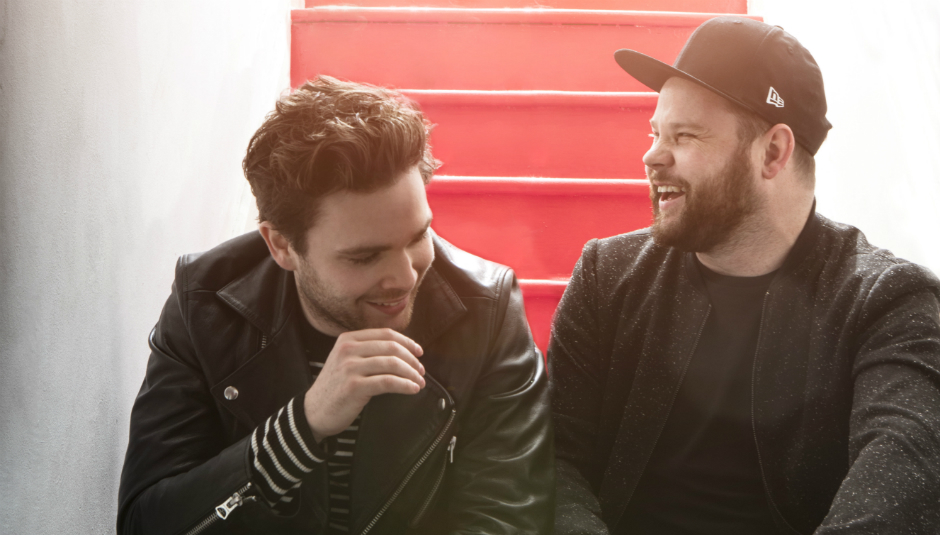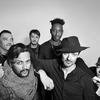When you throw out the clichéd "tricky second album" tag, Royal Blood probably encapsulate it more than any band since Arctic Monkeys went nuts back in 2006. The duo’s self-titled debut became one of the fastest-selling rock albums in decades and appeared to have a limitless supply of radio-destroying tracks to keep fans sated.
What’s for sure is that by the time they finished the touring cycle of that album, it was time for something new. The shows got stronger as the band’s confidence and performance levels grew almost as fast as the crowds they were playing in front of. But, by the time they were done, most fans agreed it was time for new tracks.
Two years later and 'Lights Out' dropped into our pockets, reminding those fans what they’d been missing. The new album, How Did We Get So Dark? is set to be released on the 16 June, and at their recent show in Brighton, they debuted even more material for their home audience. That was their first show in 18 months. We sat down with them in London the following day to talk about the pressures of quickly becoming one of the biggest bands in the UK, experimentation, critics, Glastonbury and that new album.
DiS: So how are things going? How are we feeling?
Mike Kerr: We’re good yeah. We had our first show in 18 months last night, in Brighton. So we’re both very hungover. It was almost like a wedding reception in front of all our friends and family. It was an incredible show and an incredible night and it just felt great to be back out there.
How did the newer tracks go down?
MK: So, to be honest, there was probably only two that people had never heard before. They felt great to get out there. You spend so long working on them that getting them off your shoulders is great. The crowd seemed to love them. There’s other songs off the record which people will know. 'Hook, Line And Sinker' which people will have recognised from Reading and Leeds and 'Where Are You Now?' which people may have heard on the Vinyl soundtrack.
What was the overall reaction when you’d finished the first album cycle?
MK: It was a lot to take in, you know? We were quite exhausted. The initial thing was being glad to get home and to try and get into normal life again. We had a lot to reflect on.
The cycle involved going from playing to three people to thousands quite quickly.
MK: It’s hard to describe. On paper, it went so fast for us but we always felt like we were taking it one step at a time. Every week we were doing something new for the first time and the crowds were getting that bit bigger. It was an incredible experience and in a way, we’ll never have that again.
Did it feel gradual or like it happened overnight?
MK: It wasn’t overnight. It took quite a lot of work, actually. Even though a lot of fortunate and key things happened along the way that helped. It really began with lots of touring and winning people over one at a time. There was definitely a point where the camel’s back...snapped. Then it kinda went mental.
How do you feel about the first album now?
MK: We’re really proud of it. Not in our wildest dreams did we think it would take us to the places we’ve been or give us the life we have now. We owe it a lot. There are things that we would do differently now but that’s the whole point of an album. It captures who you are as musicians or a band at that time.
What happened from the end of that album cycle to the new album?
MK: Our lives just went straight into focusing on the record. I think after a couple of weeks we’d already written quite a lot of ideas and that’s where we began. I think maybe the initial approach was how we did it on the first album so we decided to do a lot of experimenting. We tried building beats from the ground up and turning riffs into samples. We could see how we could turn it on its head. After a couple of months of that we worked out what we really liked, felt like us and we had a sonic concept for the album. After 'Lights Out', we thought we had the blueprint in a way and it was a big step forward.
Were there any low points in the recording process?
MK: Well, we did all of it in Brussels so most of it was pretty miserable. It was just gloomy and dark at that time of year. Looking back, it was quite lucky we were in that setting because we were immersed in what we were doing. It’s not like making a record in LA where there’s always something fun to do. It felt like we lived inside the record. Apart from that, we love what we do so it was good.
You posted a lot of (comedy) Instagram videos featuring piano. Does that feature heavily in the record?
MK: Those Instagram videos were just us pissing about. Yeah, there is a tune with keys on it, we managed to crowbar that into the record. Actually, there was just an old keyboard lying around and we already had a song called Hole In Your Heart composed and ready to go. Then I started playing that when I working on some melody and we thought it worked. It’s one of our favourites.
Was there ever any point in the process where you considered other band members?
MK: I think we’re thinking that all the time. The amount of mad shit we have to do on stage. Being in a two piece obviously comes with limitations and that makes it difficult at times. I think going the hard way is what we enjoy and makes us sound the way we do. Part of the experimentation was about adding loads of different instruments and as soon as we did it, it just capsized. We realised how delicate our sound is. I’m glad we tried those things because we realised what’s good about it.
What separates the new album from the first?
MK: It’s a sharper tool. Our first album was basically a collection of demos recorded quite sporadically over a couple of years. It was a discovery of what we can do in a two piece and have it sound the way it does. This time round we know how it works. We could make it more about the songs and then refining them. Particularly, the lyrics. I never intended to be a front man or a singer so I took one for the team. I just wanted to be a bit more honest and a bit more vulnerable and give it more love.
I particularly like the drums on this record. They’re quite different to the first one. Ben allowed his hip-hop influences to shine a bit more and we were a bit more ballsy about doing less.
Do you check feedback online? Particularly the negative stuff?
MK: We try to avoid all that. By the time we’ve worked on a song and recorded it and we put it out, that means that we’re happy and excited. So I think the celebrating is done already. At that point we throw it out there to the world and people can take whatever they want from it. We make music for ourselves really. I don’t know how helpful it is to read too much into it, the good and bad stuff. Ricky Gervais said the other day that reading Twitter is like reading every toilet wall in the world. If you’re on the toilet, it’s funny.
Ben Thatcher: At the end of the day, people can have their opinions and I don’t really care. As long as I think I’ve done something really good.
It’s a big slot at Glastonbury. Are we excited for that?
MK: Yeah, imagine if we said no? The first time we played, I’d never been there before. Having been there a few times now, I really understand what it’s like to be there and I get the vibe of it. It’s my favourite now, I absolutely love it. That’ll probably be one of the biggest gigs we’ll ever do it in terms of how many people are watching it.
Is it a relief having a new setlist to play?
MK: It’s nice to have them, yeah. Especially as we had that album on tour for about two years.
BT: More songs are always better. We can mix it and change them.
MK: And we can play for more than an hour.
BT: And you get different reactions to all the songs. Nobody has heard the new album yet so you get people trying to get into it. Then you smash into one of the other ones and everyone goes crazy.
Of the big names you’ve met, who was the most fun?
BT: Going on tour with Foo Fighters was a big thing for us. To have Dave and all those guys around for quite a prolonged period in 2015 and see one of the best rock bands play every night and how they work a crowd. That was probably the most inspirational moment for us.
MK: It’s great to watch an arena band not look and sound like an arena band. Bands at that level, it can so easily go wrong. You can have like twenty fans on you, four techs, they don’t move and some dodgy headset. Foo Fighters make the arena show feel like a house party.
How Did We Get So Dark? is out on June 16 via Warner Bros Records. For more information about the band, please visit their official website.






















